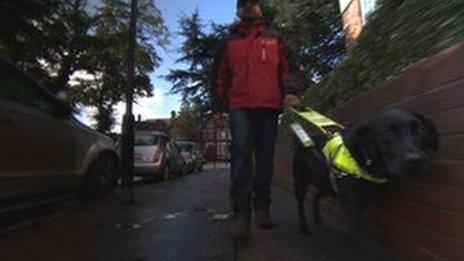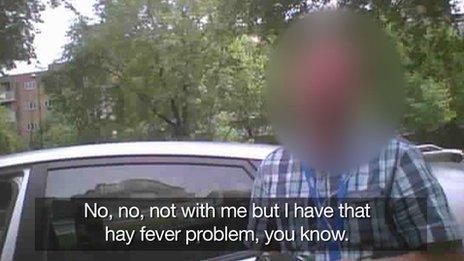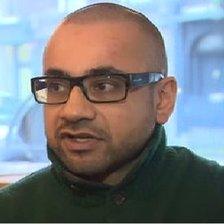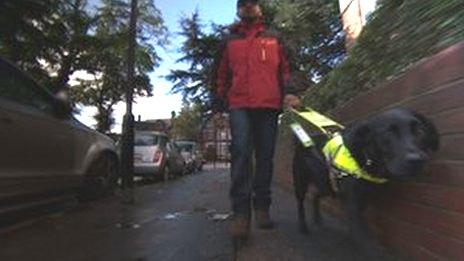Companies vow to act on BBC disabled access exposé
- Published

Lana the dog helped sniff out drivers who may be breaking the law
Some of the UK's biggest firms have begun urgent improvement schemes after a BBC London investigation exposed failures to serve disabled people.
A blind person and a wheelchair user wore secret cameras to document cafes without ramps, missing station staff and minicabs that refused guide dogs.
More than 100 restaurants are now being audited for accessibility. Training is being launched and equipment installed.
It comes after the government ordered the companies to explain their actions.
Last autumn, BBC researchers found unusable tables, or ramps missing or broken, at branches of Itsu, Costa Coffee, Eat, Caffé Nero, Caffé Concerto, Chipotle and the Post Office.
Of 20 minicab firms tested in east London, five refused to take a clearly-marked guide dog.
On four occasions, the wheelchair user got temporarily stuck on a train when staff booked to help did not arrive on time. She was also unable to board a bus due to a faulty ramp.
More accessible
Mark Harper MP, Minister for Disabled People, highlighted Eat's response as particularly praiseworthy.
New training has been put in place and 113 of its stores are being audited to make sure they are accessible.
Sarah Doyle, brand director at Eat, said of the problems highlighted at their restaurants: "We were mortified. Therefore when we saw that footage we took it very seriously and undertook to investigate.
"We've asked all our shop teams to check the equipment is there and we have put in place replacement equipment if it was required."

Five out of 20 cab firms tested by the BBC refused to take a guide dog
In further responses as a result of the investigation:
Caffé Concerto said it had now assessed all its branches and was changing some to make them more accessible.
Itsu acknowledged improvements to staff training and accessibility were needed. It said accessibility had been agreed as one of the chain's focuses for 2015 and an external accessibility firm would be employed.
Caffé Nero said its initial response to the BBC was not as sensitive to the issue as it should have been, and apologised to members of the public who subsequently contacted them.
Costa Coffee said ramp problems highlighted in the investigation have been fixed.
Southeastern Rail expressed concern with the issues uncovered and said relevant station managers had been made aware of them.
Mr Harper, who wrote to the organisations ordering them to improve, said: "Having watched the footage, there were some companies that clearly weren't doing what the law says they should be doing - but also not doing what a modern business should do in terms of the way it treats its customers."
The minister said he was encouraged by the organisations' responses - except that of Chipotle, which did not reply to his letter.
He said: "I am very disappointed Chipotle didn't even have the courtesy to reply. It does make you wonder [about their] compliance with the law and customer service."
A Chipotle spokesman told the BBC: "We believe we have addressed the concerns initially brought to our attention and are now exploring the possibility of retaining consultants to do an assessment of our restaurants to be sure they are up to standard, and to help us better understand requirements in this area."
'Weak' response
Nigel Holness, operations director for Transport for London, said of problems highlighted during the investigation: "I don't think they're acceptable, but sometimes in life these things happen. What I can say is we are very committed to providing support and assistance to people with disabilities.

Visually impaired researcher Reshi Ramlakhan said more must be done
"We've restated our commitment to working with disability groups. A third of our stations already have step free access, and over the next ten years another 40 will be added to that network.
The Equality Act obliges organisations to make reasonable adjustments for disabled people.
But Reshi Ramlakhan, the visually impaired man who documented the problems, said the government's response was "weak".
He explained: "I think ministers should be making simple, clear, concise, easy to understand legislation which makes this kind of offence a criminal offence, not a civil offence.
"I have to take it upon myself to take that person [denying me a service] to court."
Mr Ramlakhan added: "I walked down the road the other day and saw a sign that said if your dog fouls the pavement you'll be given a fine.
"Straight away, that's an immediate penalty - whereas if somebody commits an act of discrimination against me, I have to go through this long-winded process to get justice.
"It made me think that people with disabilities are worth less than dogs' mess on the street."
- Published10 November 2014
